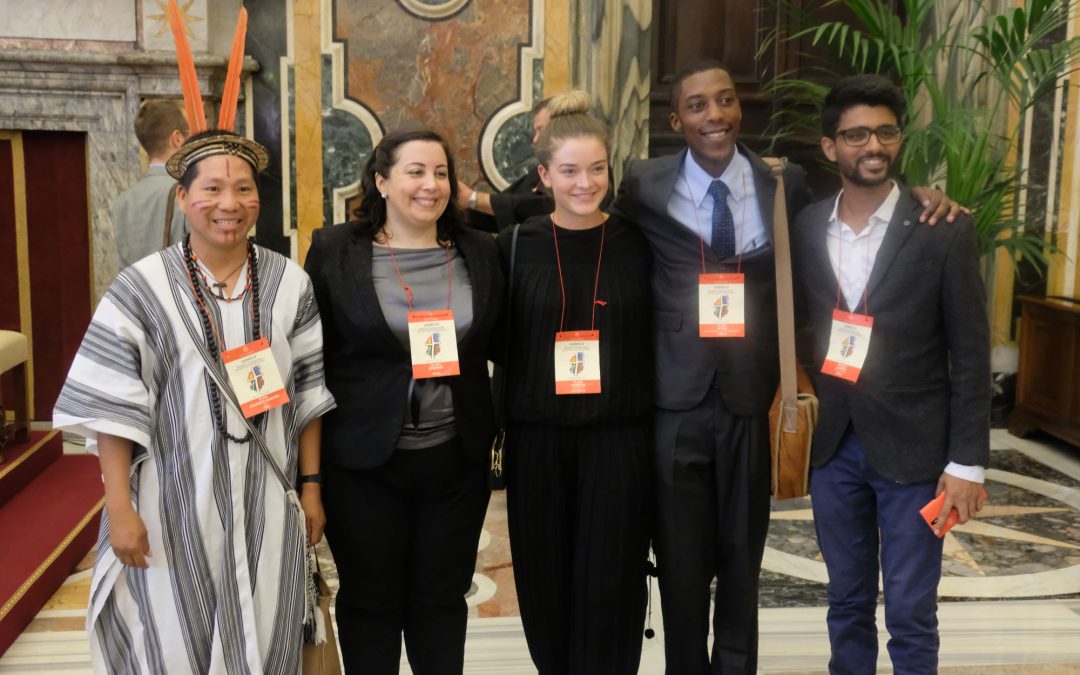Photo Credit: Caritas Internationals
An intervention at the Laudato Si’ conference
Good morning and many thanks to the Dicastery for Promoting Integral Human Development, for the privilege of being able to be in this dialogue today.
My first contact with the Encyclical was thanks to Manos Unidas, the Catholic NGO in which I am a volunteer and which, as Spanish member of CIDSE, began working since 2015 on the campaign “Change for the Planet – Care for the People.” This campaign is inspired by Laudato Si’ and one of its pillars is the creation of an international network of young volunteers committed to change.
From the beginning of it, we were urged to get to know the Encyclical. I must say that the text seemed very interesting to me, that it connected directly with contemporary challenges, with young people and with our daily life, having as a center the Christian way of being and our commitment to our brothers and sisters, especially the most vulnerable. However, I confess that at first I did not appreciate the great challenge that the Encyclical gives to each one of us. Laudato Si’ calls on us to go through a radical, personal and unique change that, shared with other people, centers our life in the love of our neighbor, understanding everything created by God to be our neighbor.
The Laudato Si’ also urges us to consider community, to work together for a better world and to take the time to discover and learn from each other. This is an aspect that I want to highlight from the CIDSE campaign. Thanks to networking, I have met other organizations and shared lessons and concerns, actively participating in a multitude of actions. On behalf of that international network of young people, I am here today.
The first shared experience was during COP21 in Paris in 2015. This was a very important historical moment as the Encyclical had just come out and the UN adopted the 2030 Agenda and the SDGs. Subsequently, we have participated in other activities such as the international camp in Casa Velha in Portugal in 2017, webinars, and the “Let’s (Be) the Change” camp in Belgium in 2018. I was especially impacted by the “March for Change” a 17 km pilgrimage we made to Fatima to attend the Vigil and Eucharist celebrated by the Pope.
After these experiences, the young people who participated realized the importance of working in a network and of replicating locally the actions that we had developed together with CIDSE and that is why, from our personal commitment, we wanted the message of the Encyclical to arrive to the people around us. For this reason, we have organized a photography contest, exhibitions in universities, and videoforums with the documentary “Stories of Change”, a new narrative that, building on Laudato Si’ and the stories of change of individuals, helps raise awareness that we can live in a different way. In addition, in Spain in less than 10 days we will host a sustainability camp around the Laudato Si’ so that more young people hear the call to join this ecological conversion proposed by the Pope. Also at the individual level I have been able to get involved in other initiatives such as the one organized by the Global Catholic Climate Movement, becoming an advocate of Laudato Sí.
But the most important thing about these experiences is not the action itself, but the commitment that each one of us is assuming in our role as active Christians in society and in relation to caring for the planet, centering our life on the love of God and Creation. For me this is one of the most beautiful messages the Encyclical offers us.
Finally, if I had to summarize what the Laudato Si’ has meant to me in these three years, I could say that it has been a path towards my own internal ecological conversion, which has helped me to be more aware of my commitment to others as a Catholic, both to people and to “our common home.” This gradual discovery has brought about an integral change in my way of life that goes beyond making good sustainability practices such as recycling or cycling. It is about living with a different scale of values and the Encyclical has been the tool that has guided my steps and has impelled me to take action and commit myself to be an agent of change in my sphere, in my family, and in my work and go further through networking to feel part of a global movement of commitment to change. It is not a passing fad, it is the real challenge that the Pope gives to you and me: to be aware of the responsibility for what is happening on our planet and be active participants in the change to a world of love.

